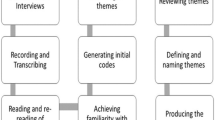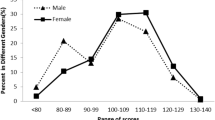Abstract
Objective
Empathy is a prominent goal of medical education that is too often underachieved. Using concept mapping, the authors constructed a student-generated conceptual model of factors viewed as affecting empathy during medical education.
Methods
During the 2005–2006 academic year, 293 medical students and interns answered a brainstorming survey asking respondents to list factors affecting empathy, and 34 participants then sorted the factors into categories and rated each factor’s relative importance. Factors and ratings were examined using multidimensional scaling and cluster analyses, Pearson’s r, and Student’s t test. This process, known as “concept mapping,” was conducted using Concept Systems.
Results
One hundred sixty perceived empathy factors were identified and sorted into four clusters: personal experiences, connections and beliefs; negative feelings and attitudes toward patients; mentoring and clinical experiences that promote professional growth (rated most important); and school and work experiences that undermine development of empathy (rated least important). All students rated factors in a similar hierarchical fashion across all four clusters with no differences among groups. Listening was the most highly rated factor.
Conclusion
Students consider experiences that promote personal and professional growth to be the most important factors affecting empathy in medical education. Though less important to students, negative feelings and attitudes toward patients, as well as negative school and work experiences, affect empathy at all stages of education.
Similar content being viewed by others
References
American Board of Internal Medicine: Professionalism in medicine: issues and opportunities in the educational environment, in American Board of Internal Medicine: Project Professionalism, 2001. pp 5–10. Available at www.abim.org/pdf/publications/professionalism.pdf
Di Blasi Z, Harkness E, Ernst E, et al: Influence of context effects on health outcomes: a systematic review. Lancet 2001; 357: 757–762
Hojat M, Mangione S, Nasca TJ, et al: An empirical study of decline in empathy in medical school. Med Educ 2004; 38: 934–941
Hojat M, Mangione S, Nasca TJ, et al: Empathy scores in medical school and ratings of empathic behavior in residency training 3 years later. J Soc Psychol 2005; 145: 663–672
Bellini LM, Shea JA: Mood change and empathy decline persist during three years of internal medicine training. Acad Med 2005; 80: 164–167
Rosen IM, Gimotty PA, Shea JA, et al: Evolution of sleep quantity, sleep deprivation, mood disturbance, empathy and burnout among interns. Acad Med 2006; 81: 82–85
Chen D, Lew R, Hershman W, et al: A cross-sectional measurement of medical student empathy. J Gen Intern Med 2007; 22: 1434–1438
Newton BW, Barber L, Clardy J, et al: Is there hardening of the heart during medical school? Acad Med 2008; 83: 244–249
Feighny KM, Arnold L, Monaco M, et al: In pursuit of empathy and its relation to physician communication skills: multidimensional empathy training for medical students. Ann Behav Sci Med Educ 1998; 5: 13–21
Woloschuk W, Harasym PH, Temple W: Attitude change during medical school: a cohort study. Med Educ 2004; 38: 522–534
Griffith CH, Wilson JF: The loss of student idealism in the 3rd-year clinical clerkships. Eval Health Prof 2001; 24: 61–71
Shanafelt TD, West C, Zhao X, et al: Relationship between increased personal well-being and enhanced empathy among internal medicine residents. J Gen Inern Med 2005; 20: 559–564
Thomas MR, Dyrbe LN, Huntington JL, et al: How do distress and well-being relate to medical student empathy? A multicenter study. J Gen Intern Med 2007; 22: 177–183
West CP, Huschka MM, Novotny PJ, et al: Association of perceived medical errors with resident distress and empathy. JAMA 2006; 296: 1071–1078
Jackson K, Trochim WK: Concept mapping as an alternative approach for the analysis of open-ended survey responses. Organizational Research Methods 2002; 5: 307–336
Kane M, Trochim WK: Concept Mapping for Planning and Evaluation. Thousand Oaks, Calif, Sage Publications, 2007
Donnelly JP, Donnelly K, Grohman KK: A multi-perspective concept mapping study of problems associated with traumatic brain injury. Brain Inj 2005; 19: 1077–1085
Sutherland S, Katz S: Concept mapping methodology: a catalyst for organizational learning. Eval Program Planning 2005; 28: 257–269
Trochim WK: The Concept System. Ithaca, NY, Concept Systems, 2005
Krippendorf K: Content Analysis: An Introduction to Its Methodology. Newbury Park, Calif, Sage Publications, 1980
Dunn W: Public Policy Analysis: An Introduction. Englewood Cliffs, NJ, Prentice Hall, 1981
Keith D: Refining concept maps: methodical issues and an example. Eval Program Plann 1989; 12: 75–80
Davison M: Multidimensional Scaling. New York, John Wiley & Sons, 1983
Ward JH: Hierarchical grouping to optimize an objective function. J Am Statistical Assoc 1963; 58: 236–244
Everitt B: Cluster Analysis. New York, Halstead Press-John Wiley & Sons, 1980
Anderberg M: Cluster Analysis for Applications. New York, Academic Press, 1973
Carley K: Coding choices for textual analysis: a comparison of content analysis and map analysis, in Sociological Methodology. Edited by Marsden P. Washington, DC, Blackwell Scientific-American Sociological Association, 1993, 23: 75–126
Trochim WK: Pattern matching, validity, and conceptualization in program evaluation. Evaluation Rev 1985; 9: 575–604
Dyrbye LN, Thomas MR, Huntington JL, et al: Personal life events and medical student burnout: a multicenter study. Acad Med 2006; 81: 374–384
Aagaard EM, Hauer KE: A cross-sectional descriptive study of mentoring relationships formed by medical students. J Gen Intern Med 2003; 18: 298–302
Hauer KE, Teherani A, Dechet A, et al: Medical students’ perceptions of mentoring: a focus-group analysis. Med Teach 2005; 27: 732–734
Kenney NP, Mann KV, MacLeod H: Role modeling in physicians’ professional formation: reconsidering an essential but untapped educational strategy. Acad Med 2003; 78: 1203–1210
Broquet KE, Rocky PH: Teaching residents and program directors about physician impairment. Acad Psychiatry 2004; 28: 221–225
Dunn L, Iglewicz A, Moutier C: A conceptual model of medical student well-being: promoting resilience and preventing burnout. Acad Psychiatry 2008; 32: 44–53
Author information
Authors and Affiliations
Corresponding author
Additional information
At the time of submission, the authors declared no competing interests.
Rights and permissions
About this article
Cite this article
Winseman, J., Malik, A., Morison, J. et al. Students’ Views on Factors Affecting Empathy in Medical Education. Acad Psychiatry 33, 484–491 (2009). https://doi.org/10.1176/appi.ap.33.6.484
Received:
Revised:
Accepted:
Published:
Issue Date:
DOI: https://doi.org/10.1176/appi.ap.33.6.484




